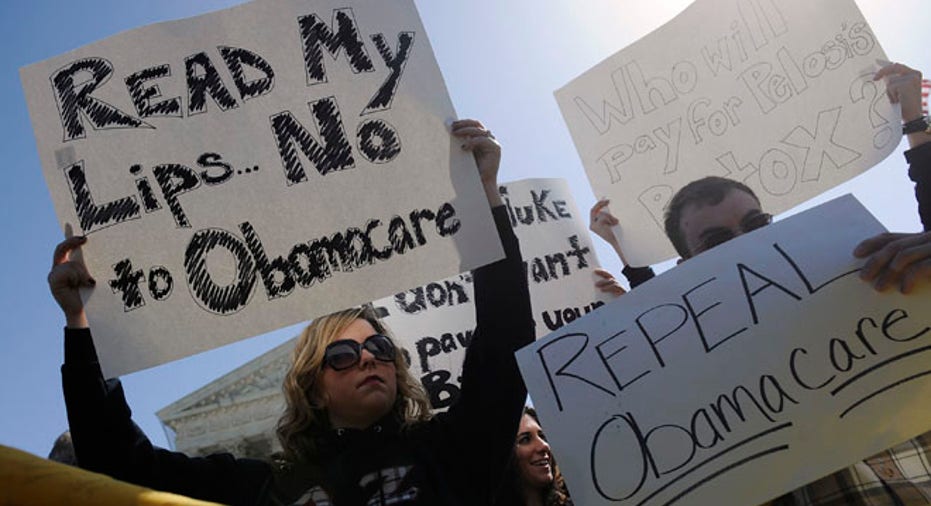Federal Court Throws Out Subsidies: What Happens Now?

Millions of Americans rely on subsidies to afford health insurance under the Affordable Care Act’s mandate, but the fate of those cost-saving tax credits is now in limbo.
A Washington, D.C. federal appeals court ruled Tuesday that the subsides 4.7 million people banked on
to buy insurance on the federal exchange, HealthCare.gov, are illegal.
Nine in ten people who enrolled in insurance plans during the law first open enrollment period received subsidies to lower the cost of care, paying an average $69 for out-of pocket for premiums, according to the Department of Health and Human Services. Subsidies area available for those making up to 400% of the federal poverty level in 2014, which was about $94,000 for a family of four and $45,000 for individuals. More than five million people enrolled on the federal exchange.
These tax credits are available on both state and federal exchanges, but in Tuesday’s 2-1 Halbig vs. Burwell ruling, the federal exchange subsidies were not legal. The plaintiffs argued that the IRS acted without congressional approval in expanding the subsidy program into states that opted not to set up exchanges.
The ACA gave states the option to set up their own exchanges, and 36 states opted not to do so. Healthcare.gov was meant to serve in lieu of state exchanges.
Sam Kazman, general counsel for the Competitive Enterprise Institute, which is coordinating the case on behalf of small business owners and individuals across six states, says the ruling is a win for states’ rights.
“Today’s court decision to strike down the illegal IRS rule is a victory for the rule of law. It is also a victory for states’ rights and welcome relief to the individuals, small businesses and employees who live in the 36 states that chose to opt out of establishing ObamaCare insurance exchanges. This illegal rule would have cost employers crippling fines, destroyed jobs, and forced Americans to pay for insurance that they didn’t want or need,” Kazman said in a statement.
Others argue the ruling is short-sighted and likely to be reversed. Timothy Jost, Robert L. Willett Family professor of law at the Washington and Lee University, says the court “reasoned away” congressional intentions in regards to how the federal exchange would operate. The case will likely head to the Supreme Court.
“It’s clear Congress intended all exchanges, including the federal exchange, to issue premium tax credits,” Jost says. “There are provisions [in the law] that make no sense unless federal exchanges have tax credits. This focuses solely on working that is found in two subsections of the statute.”
In its ruling, the court wrote “we reach this conclusion, frankly, with reluctance” and that it “will likely have significant consequences both for millions of individuals receiving tax credits through federal Exchanges and for health insurance markets more broadly."
It also said: "Section 36B plainly makes subsidies available in the Exchanges established by states," wrote Senior Circuit Judge Raymond Randolph in his majority opinion in the case.
Elizabeth Taylor, executive director the National Health Law Program, says the decision is disappointing and “guts” the intent of the ACA.
“The reality is that people signed up for coverage with the expectation and promise that they would get a tax subsidy—the system doesn’t work for millions of people if they don’t get this subsidy,” Taylor says.
What Happens Next
White House Press Secretary Josh Earnest told reporters in his daily briefing that the subsidies will continue to “flow” to those who received them.
“Congress intended for every eligible American to have access to tax credits to lower costs [of health care]… this will work its way through the legal process and we are confident in the legal case the Department of Justice will make,” Earnest said.
Jost says he expects the D.C. circuit court will vacate this decision quickly. The 4th Circuit court ruled in the opposite direction shortly after the appeals decision was handed down. Those who received subsidies won’t be impacted immediately, as the federal government has time to seek a re-hearing.
“I am not sure that those who received subsidies will have to pay them back, but they would lose their health insurance,” he says. “Congress couldn’t have expected that two-thirds of states would be denied premium tax credits.”
And if the ruling stands, those reliant on these subsidies to pay for their insurance may opt to not enroll at all, or drop their coverage due to cost.
“As of right now, there will be no subsidies available on the federal exchange,” he says. “I think people are going to understand that this is an aberration and that things will move on from here. This is a speed bump that will be reversed, and I think people who are enrolling need to continue full speed ahead and ignore this decision for now.”



















